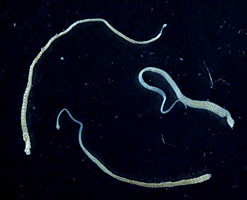 Hymenolepis nana, also known as the dwarf tapeworm, is the smallest tapeworm that can infect humans, causing the condition known as hymenolepiasis. Unlike most tapeworms, which require an intermediate host to complete their life cycle, Hymenolepis nana can complete its lifecycle entirely within a single human host, making human-to-human transmission more common. It is most frequently transmitted through ingestion of contaminated food, water, or contact with fecal matter that contains the eggs of the parasite.
Hymenolepis nana, also known as the dwarf tapeworm, is the smallest tapeworm that can infect humans, causing the condition known as hymenolepiasis. Unlike most tapeworms, which require an intermediate host to complete their life cycle, Hymenolepis nana can complete its lifecycle entirely within a single human host, making human-to-human transmission more common. It is most frequently transmitted through ingestion of contaminated food, water, or contact with fecal matter that contains the eggs of the parasite.
Infections are most prevalent in areas with poor sanitation and hygiene, particularly among children. Symptoms of hymenolepiasis can range from mild to severe, depending on the level of infection. They may include gastrointestinal issues such as abdominal pain, nausea, diarrhea, loss of appetite, and weight loss. In severe cases, especially in immunocompromised individuals or in those with heavy worm burdens, the infection can cause weakness, irritability, and even neurological symptoms.
Treatment for hymenolepiasis involves antiparasitic medications like praziquantel or niclosamide, which target the adult worms in the intestines. Prevention relies on improved sanitation, hygiene practices, and avoiding ingestion of contaminated food or water.



